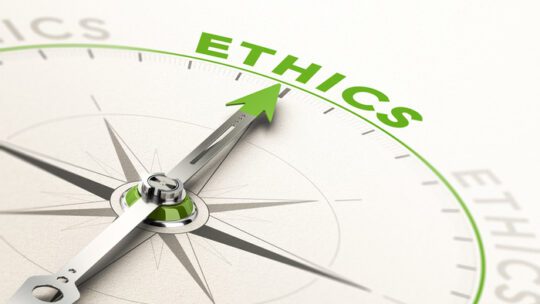
A prominent government official doesn’t practice what he preaches. An internet site is accused of plagiarism. A corporate titan takes advantage of insider information.
These random examples broadly represent the challenges PR professionals, whose job is to communicate the truth, often face. And what do all these situations have in common? Ethics, of course.
And not just ethics as a particular and important set of principles, but as a state of mind, a behavioral guidepost, a moral imperative.
At PRSA, September is Ethics Month, a time when we specifically focus on and celebrate our Code of Ethics, which is at the heart of what we believe in as communicators as well as how we practice our craft every day.
But ethical dilemmas, as we well know, don’t follow the calendar year; we find ourselves constantly immersed in quandaries and quagmires that require close attention and expertise.
Throughout what has been, and continues to be, an immensely difficult time, PR pros, myself included, are reflecting more on the many changes taking place across the societal landscape.
As events and shifting perspectives influence our values and mindset, how are they affecting our ethical priorities and strategies?
With this in mind, below are basic tenets and best ethical practices for communication professionals.
Question Everything
Let’s bring back fact-checking as a passion, and fully embrace our roles as ethicists, truthtellers and purveyors of honesty.
Misinformation, which can lead to an unbreakable chain of unintended negative consequences, has gone from being chosen as the dictionary.com word of the year in 2018–long before the arrival of COVID-19–to being declared a “serious threat to public health” by the U.S. Surgeon General last July.
Let’s work to help make misinformation, its evil cousin disinformation, and all that they represent, end, not trend.
Don’t be Afraid to Trust your Gut
You know the feeling. You’re in a situation where you have done proper due diligence, gathered and digested information. Yet you are unsure how to resolve a particular question.
In these instances, consider the proverbial gut check as a supplemental decision factor.
If you suspect you’re in a dangerous moral neighborhood, you probably are. You’ll feel it in your stomach–and your heart–that you shouldn’t cross that ethical boundary; there’s a visceral reaction that sounds the alarm.
You might think this suggestion is a bit mystical, but it works.
Vigilance, Always Vigilance
We can hope we won’t face one massive crisis situation that will require herculean, make-or-break ethics management.
Instead, we need to look out for the possibility of death by a thousand pinpricks, a series of moments, such as being asked to interpret research to fit a particular narrative, or round up data in a press release, or fudge facts due to an impending deadline, which can add up and eventually wear down our ethical edge.
No truly professional PR practitioner sets out to slide down that slippery slope, but it’s critical to remember: there are no ethical shortcuts.
The Future is Here
As technology continues to develop, so too will our ethical strategies. How we conduct business will require new definitions, viewpoints and approaches to our work with clients.
For example, Gartner predicts that artificial intelligence (AI) used in marketing across the globe will increase in value from $12 million in 2020 to $107 million by 2028. AI already is used for such tasks as media monitoring, content creation and data collection. Whether you welcome or fear AI, it’s here to stay; what will be our ethical reference points?
In a recent Pew report, Stephen Downes, senior research officer for digital technologies, National Research Council of Canada, said, “Ultimately, our AI will be an extension of ourselves, and the ethics of our AI will be an extension of our own ethics.”
Add to this discussions to be had involving technologies such as virtual reality, augmented reality and the metaverse; you’ve seen “The Matrix,” right? And you thought you just had to worry about working with a company executive who doesn’t understand ‘conflict of interest.’
Ethics Month is a great time to reexamine and recommit to the ethical frameworks that guide us professionally as well as personally. But it can also serve as an important jumping-off point for the opportunities and challenges we face in the months and years ahead.
Contact: [email protected]
